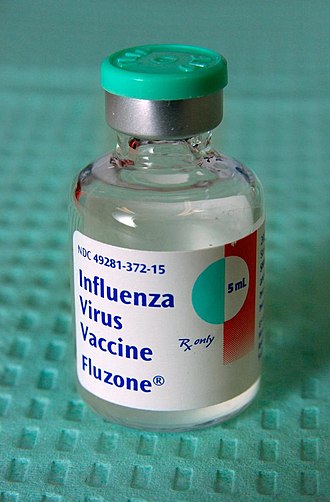Vaccine efficacy
Overview of vaccine efficacy
Vaccine efficacy[edit]

Vaccine efficacy refers to the percentage reduction of disease in a vaccinated group of people compared to an unvaccinated group under optimal conditions. It is a measure used to determine how effective a vaccine is at preventing a specific disease. Vaccine efficacy is typically assessed in clinical trials before a vaccine is approved for public use.
Calculation of vaccine efficacy[edit]
Vaccine efficacy is calculated using the following formula:
- \( VE = \frac{(ARU - ARV)}{ARU} \times 100 \%
where:
- \( VE \) is the vaccine efficacy,
- \( ARU \) is the attack rate in the unvaccinated group,
- \( ARV \) is the attack rate in the vaccinated group.
This formula provides the percentage reduction in disease incidence among the vaccinated group compared to the unvaccinated group.
Factors affecting vaccine efficacy[edit]
Several factors can influence the efficacy of a vaccine, including:
- Age of the recipient: Some vaccines may be less effective in older adults or very young children.
- Immune status: Individuals with compromised immune systems may not respond as well to vaccines.
- Viral mutations: Changes in the virus, such as those seen in influenza, can affect how well a vaccine works.
- Vaccine storage and handling: Improper storage can reduce vaccine potency.
Vaccine effectiveness[edit]
While vaccine efficacy is measured under controlled clinical trial conditions, vaccine effectiveness refers to how well a vaccine performs in the real world. Effectiveness can be influenced by factors such as population demographics, vaccine coverage, and the presence of circulating virus strains.
Importance of vaccine efficacy[edit]
Understanding vaccine efficacy is crucial for public health planning and decision-making. High efficacy vaccines can lead to herd immunity, reducing the spread of infectious diseases within a community. This is particularly important for diseases with high transmission rates.
Related pages[edit]
Ad. Transform your life with W8MD's Budget GLP-1 injections from $75


W8MD offers a medical weight loss program to lose weight in Philadelphia. Our physician-supervised medical weight loss provides:
- Weight loss injections in NYC (generic and brand names):
- Zepbound / Mounjaro, Wegovy / Ozempic, Saxenda
- Most insurances accepted or discounted self-pay rates. We will obtain insurance prior authorizations if needed.
- Generic GLP1 weight loss injections from $75 for the starting dose.
- Also offer prescription weight loss medications including Phentermine, Qsymia, Diethylpropion, Contrave etc.
NYC weight loss doctor appointmentsNYC weight loss doctor appointments
Start your NYC weight loss journey today at our NYC medical weight loss and Philadelphia medical weight loss clinics.
- Call 718-946-5500 to lose weight in NYC or for medical weight loss in Philadelphia 215-676-2334.
- Tags:NYC medical weight loss, Philadelphia lose weight Zepbound NYC, Budget GLP1 weight loss injections, Wegovy Philadelphia, Wegovy NYC, Philadelphia medical weight loss, Brookly weight loss and Wegovy NYC
|
WikiMD's Wellness Encyclopedia |
| Let Food Be Thy Medicine Medicine Thy Food - Hippocrates |
Medical Disclaimer: WikiMD is not a substitute for professional medical advice. The information on WikiMD is provided as an information resource only, may be incorrect, outdated or misleading, and is not to be used or relied on for any diagnostic or treatment purposes. Please consult your health care provider before making any healthcare decisions or for guidance about a specific medical condition. WikiMD expressly disclaims responsibility, and shall have no liability, for any damages, loss, injury, or liability whatsoever suffered as a result of your reliance on the information contained in this site. By visiting this site you agree to the foregoing terms and conditions, which may from time to time be changed or supplemented by WikiMD. If you do not agree to the foregoing terms and conditions, you should not enter or use this site. See full disclaimer.
Credits:Most images are courtesy of Wikimedia commons, and templates, categories Wikipedia, licensed under CC BY SA or similar.
Translate this page: - East Asian
中文,
日本,
한국어,
South Asian
हिन्दी,
தமிழ்,
తెలుగు,
Urdu,
ಕನ್ನಡ,
Southeast Asian
Indonesian,
Vietnamese,
Thai,
မြန်မာဘာသာ,
বাংলা
European
español,
Deutsch,
français,
Greek,
português do Brasil,
polski,
română,
русский,
Nederlands,
norsk,
svenska,
suomi,
Italian
Middle Eastern & African
عربى,
Turkish,
Persian,
Hebrew,
Afrikaans,
isiZulu,
Kiswahili,
Other
Bulgarian,
Hungarian,
Czech,
Swedish,
മലയാളം,
मराठी,
ਪੰਜਾਬੀ,
ગુજરાતી,
Portuguese,
Ukrainian